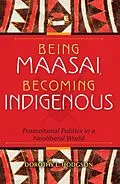What happens to marginalized groups from Africa when they ally with the indigenous peoples' movement? Who claims to be indigenous and why? Dorothy L. Hodgson explores how indigenous identity, both in concept and in practice, plays out in the context of economic liberalization, transnational capitalism, state restructuring, and political democratization. Hodgson brings her long experience with Maasai to her understanding of the shifting contours of their contemporary struggles for recognition, representation, rights, and resources. Being Maasai, Becoming Indigenous is a deep and sensitive reflection on the possibilities and limits of transnational advocacy and the dilemmas of political action, civil society, and change in Maasai communities.
Autorentext
Dorothy L. Hodgson is Professor and Chair of Anthropology at Rutgers University, where she is affiliated with the Center for African Studies and the Women's and Gender Studies Department. She is author of Once Intrepid Warriors (IUP, 2001) and The Church of Women (IUP, 2005).
Inhalt
Preface
List of Key Organizations and Documents
Introduction: PositioningsThe Cultural Politics of Representation, Recognition, Resources, and Rights
1. Becoming Indigenous in Africa
2. Maasai NGOs, the Tanzanian State, and the Politics of Indigeneity
3. Precarious Alliances
4. Repositionings: From Indigenous Rights to Pastoralist Livelihoods
5. "If We Had Our Cows": Community Perspectives on the Challenge of Change
Conclusion: What Do You Want?
Notes
Bibliography
Index
